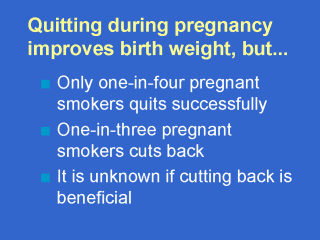 |
Because many adverse outcomes
associated with smoking are rare (such as SIDS, abruptio placenta, and perinatal death),
birth weight is frequently used as an outcome in studies of smoking in pregnancy. Most
studies published to date report an average decline in birth weight among smokers of
200-300 grams. Smoking may be responsible for up to 30 percent of all cases of low birth
weight. Despite the risks, most women are unable to stop smoking during pregnancy. Only
one-in-four quits successfully. However, one-in-three reduces the amount smoked. The
effect of reducing the amount smoked (without quitting) on birth outcomes is unknown.
|
